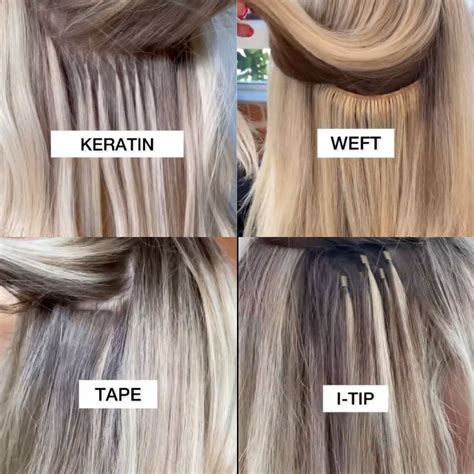Key Hair Extension Types
-
Clip-In Extensions:
– Painless and temporary
– Clip easily into natural hair
– Available in various lengths, colors, and textures
-
Tape-In Extensions:
– Invisible and long-lasting
– Tapes adhere to small sections of natural hair
– Can last up to 6-8 weeks -
Fusion Extensions:
– Permanent and durable
– Keratin bonds attach extension strands to natural hair
– Requires professional installation and removal -
Weave Extensions:
– Traditional and versatile
– Braids or beads hold extension strands in place
– Offers full coverage and volume -
Micro Link Extensions:
– Discreet and less damaging
– Small metal beads secure extensions to natural hair
– Lasts longer than clip-ins -
I-Tip Extensions:
– Similar to micro links, but with individual strands
– Keratin tips heat-fused to natural hair
– Can create seamless blends -
Sew-In Extensions:
– Flatter against the scalp
– Cornrows or tracks sewn into natural hair
– Requires regular maintenance -
Ponytail Extensions:
– Easy and time-saving
– Wrap-around or clip-on styles
– Adds instant length and volume -
Halo Extensions:
– Comfortable and invisible
– Nylon thread sits around the crown
– Creates a natural-looking halo of hair -
Tape In Bead Extensions (TIBE):
– Combines tape-in and bead extensions
– Tapes adhere to natural hair, while beads hold strands in place
– Offers both versatility and longevity
Applications for Hair Extensions
Hair extensions have numerous applications, including:
- Add length and volume: Instantly transform short or fine hair into a luscious mane.
- Experiment with color and style: Try different shades and textures without committing to permanent changes.
- Cover hair loss and thinning: Conceal patches of missing hair or restore thickness.
- Create special occasion looks: Elevate your hairstyle for weddings, proms, or special events.
Choosing the Right Type
The best type of hair extension depends on individual preferences, lifestyle, and hair condition. Consider factors such as:
- Desired effect: Full coverage, volume, or color enhancement
- Budget: Costs vary widely depending on the type and amount of extensions used
- Maintenance: Some extensions require professional installation and regular upkeep
- Hair type: Certain extensions may not be suitable for all hair textures or conditions
Pain Points and Motivations
Pain points associated with hair extensions include:
- Cost: Extensions can be expensive, especially for high-quality materials and professional installation.
- Damage: Some extension methods can cause hair breakage if not applied or removed correctly.
- Maintenance: Regular appointments for adjustments and removals can be time-consuming.
Motivations for using hair extensions include:
- Confidence boost: Enhance self-esteem with fuller, longer, or more stylish hair.
- Creative expression: Experiment with different looks to match personal style.
- Professional advancement: Improve appearance for job interviews, presentations, or public events.
Strategies for Success
To ensure successful hair extension use:
- Consult a professional: Seek advice from a licensed hair stylist or extension specialist to determine the best type and application method.
- Choose high-quality extensions: Invest in extensions made from natural human hair or premium synthetic materials to avoid damage and ensure durability.
- Follow care instructions: Adhere to recommended washing, styling, and maintenance guidelines to extend the lifespan of the extensions.
- Be patient: Extensions can take time to blend seamlessly with natural hair and require regular adjustments.
Pros and Cons Table
| Type | Pros | Cons |
|---|---|---|
| Clip-In | Painless, easy to use, affordable | Temporary, may slip or shift |
| Tape-In | Invisible, durable, blends well | Requires professional installation, may cause hair loss |
| Fusion | Permanent, undetectable | Damages hair, expensive, requires professional removal |
| Weave | Versatile, full coverage | Can be bulky, requires braiding or beads |
| Micro Link | Discreet, less damaging | Time-consuming installation, may cause tangles |
Materials Table
| Material | Origin | Properties |
|---|---|---|
| Human Hair | Natural human hair | High-quality, soft, blends seamlessly |
| Synthetic Hair | Man-made fibers | Affordable, durable, but can be less natural-looking |
| Remi Hair | Top-grade human hair | Cuticles facing the same direction, tangle-free |
| Double Drawn Hair | Premium human hair | Thicker strands, reduces shedding and tangling |
Price Table
| Type | Average Cost (per bundle) |
|---|---|
| Clip-In | $50-$150 |
| Tape-In | $200-$400 |
| Fusion | $300-$600 |
| Weave | $250-$500 |
| Micro Link | $400-$800 |
Maintenance Table
| Type | Maintenance Frequency |
|---|---|
| Clip-In | Wash and style as needed |
| Tape-In | Re-taping every 6-8 weeks |
| Fusion | Removal and re-application every 3-4 months |
| Weave | Touch-ups and tightening as needed |
| Micro Link | Regular brushing and detangling |
